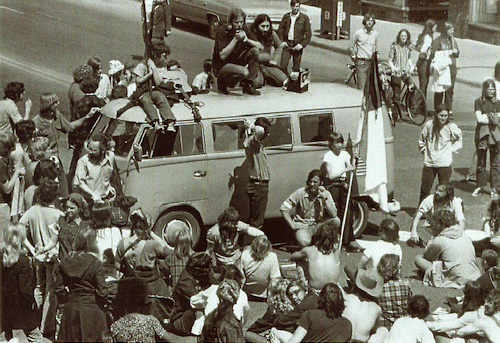If you live in a college town like I do, you’ve probably noticed that the streets go unpaved and everyone pays exorbitant taxes so the state can give free abortions to black girls. That’s because all the students overbalance the electorate, forcing real, over-25 human beings to cow to their agenda of ignorance and, I dunno, socialism. College students don’t know anything about politics. They may live in one town for four to six years, but they don’t actually live there, because they’re too busy swallowing live goldfish and listening to raps. They’re not real people, which is why they should only be allowed to vote wherever they came from—presumably where their parents live. That’s the reasoning behind House Bill 176 in New Hampshire, which would bar college students from voting in the cities where they attend school, and Republican opposition to HB 130 in Montana, which would have expanded voting by mail.
While Republicans in the two states advocate diametrically opposed approaches—HB 176 would require students to vote absentee, whereas opponents of HB 130 argue that it would be a disaster to let them do so—they aim at the same mark: to prevent college students from, you know, messing up adult politics. Sure, the legal voting age is 18, and leaving town for three months a year is not usually considered grounds for disenfranchisement—in some cases, it makes you a state legislator. But college students aren’t really residents of the places they live, as any person living there who does not go to college will tell you.
“The reasoning behind this bill is that issues differ by state,” Michael Weeden (R-Strafford, NH) told the UNH student newspaper. “Many college students are more knowledgeable of the issues where they are a domicile, rather than where they attend college.” His stand on this issue doesn’t just come from reading some talking point that he didn’t fully understand, either. It comes from his genuine concern that students who are houses, apartment complexes and stables in their home states might not be up on local politics.
Weeden is himself a sophomore at UNH, which makes his argument that students are ignorant of political issues somewhat confusing. It probably just means he knows that much better how irresponsible students are, though—kind of like Montana representative Ken Peterson (R–Billings,) who is not now a college student but remembers being a dumb one:
“I went to college myself and I know that sometimes you are not very motivated to do the right thing,” Peterson told the UM Kaiman. “You are thinking about totally other things, so I don’t think we should set up a special class to try to drag them to the polls.”
The “special class” to which Peterson refers is the voter outreach that Montana extends to other highly mobile groups in the state, but which his colleagues on the Republican side of the legislature argue shouldn’t apply to students. Again, the primary reason seems to be that college students don’t really count as whatever, although there is also the problem of a massive and complex fraud conspiracy. I quote the Kaiman:
Rep. Champ Edmunds, R-Missoula, described how UM students could scheme to forge ballots. He said that since mail is delivered to dorms in bulk “where students, not postal workers, sort each piece,” Resident Assistants could easily forge the ballots instead of putting them into the mailboxes. Edmunds also noted how a student working in the Griz Card Center could work with a nefarious RA to fool state election officials that check for forged signatures. “In order to receive a Griz Card, which is mandatory for every student at UM, you have to go and sign a piece of paper validating the information on the card,” Edmunds said. “Again, a student is in charge of this process. This means that every student signature can be accessible.”
That’s college students for you: disorganized, lazy, unable to follow local politics, but easily capable of intercepting and forging 13,000 mail-in ballots before using computer images of signatures to foil an FEC investigation.
Such concerns over fraud meant that HB 130 was defeated in the House by a 42-57 vote, largely along party lines. It so happens that—as with unions and people in poor neighborhoods—only one thing can be definitively said about the people Republican representatives suspect of massive election fraud: they tend to vote Democrat. They’re just kids, after all, making kid decisions. That’s how you know they’re not real. If they were actual adults with legitimate opinions, they’d buy some houses, lower some property taxes, and start pulling the ladder up after them.





Once they dispose of college students, they can move on to people of color, people with accents, women, and other transient, fraud-prone people with childlike understanding of issues. I believe this was tried with considerable, if temporary, success in Mississippi.
When I was an RA, I spent a lot of time committing mail fraud and very little time trying to keep Benny Sapp from starting Hillcrest on fire or trying to figure out how to get laid as an RA. I think many RAs were like me.